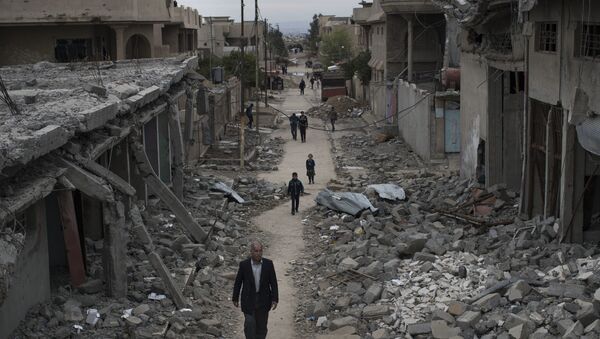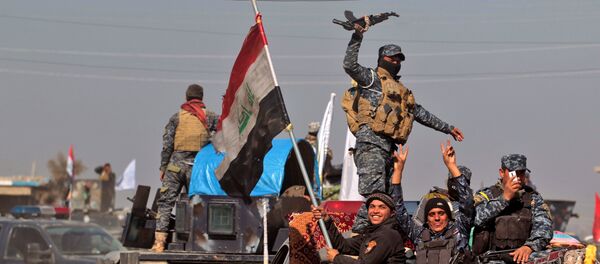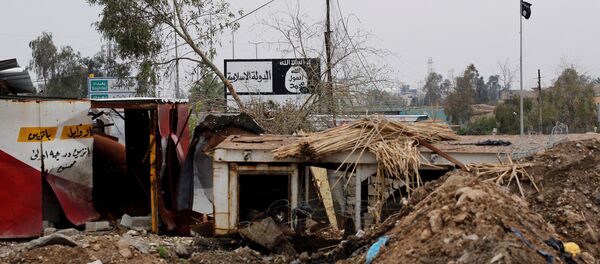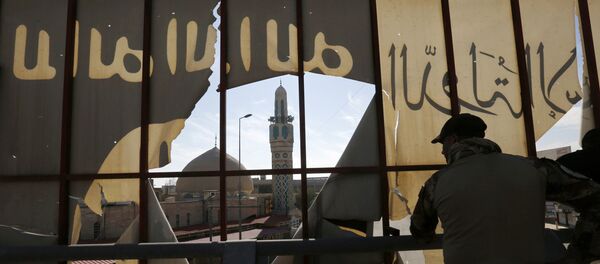Earlier, the chief of US operations in Iraq and Syria, Gen. Stephen Townsend, called the Mosul operation "the most significant urban combat to take place since World War II," adding it is "tough and brutal."
Recently, The New York Times reported that the Pentagon has launched a probe into reports about 240 Mosul civilians killed in a series of airstrikes between March 17 and 23.
Envoy’s Speech
On March 30, the Iraqi news website Shafaq News reported that a mass grave was found in the southern part of the city, containing the bodies of those killed by Daesh militants and during bombings.
A total of 1,500 tons of munitions have been dropped on Mosul since the US-led coalition aerial operation began in last October.
US military commanders and officials have repeatedly said that large cities such as Mosul cannot be liberated without civilian casualties. At the same time, during the liberation of Syrian Aleppo, Washington criticized Russia’s military actions, nearly equating them to genocide. No facts of civilian causalities from Russia’s military activities in Syria have been provided though.
Recently, US envoy to UN Nikki Haley condemned actions by Russia, Iran and the Syrian government as "war crimes."
Meanwhile, Halley praised US actions and called the United States the "moral conscience" of the world.
Commenting on the situation, RIA Novosti contributor Andrei Kots noted that US diplomacy has once again resorted to a tactic Washington has been using since the beginning of the Russia military campaign in Syria.
According to the author, this approach can be interpreted like this: "Civilian deaths from US airstrikes are accidental while Russia deliberately bombs civilians."
"In light of Middle East events, US President Donald Trump’s position to Russia’s involvement is much similar to the policy of his predecessor Barack Obama," he added.
According to Sergei Sudakov, a specialist in US policy and professor at the Academy of Military Sciences, preparations for a meeting between Trump and Russian President Vladimir Putin have "begun at the front of the information war."
"Apparently, Trump doesn’t have a clear strategy for talks with Putin so far. But the scenario of negotiating from a position of strength is in consideration. What Haley said was not her personal opinion. This was the position formulated by the president," Sudakov told Sputnik.
Reputation Game
According to Sudakov, Trump is trying to capitalize on anti-Russian rhetoric and deny all allegations about his connections with Moscow. Moreover, his reputation as a strong leader is shadowed by the delayed Mosul operation, which was initially expected to last just a couple of months. At the same time, Russia’s achievements in Syria are visible, including the liberation of Aleppo.
"In order to save face, Trump needs to downplay Russia’s success in Syria and tell the world that Russia is a blood-thirsty criminal state while the US brings peace and democracy to Iraq. Washington will spare no expense on that. In 2016, the US spent some $350 million on the information standoff with Russia. As for the 2017 budget proposal, the sum will be no less," the expert said.
Media Blockade
According to Anatoly Tsyganok, head of the Russian Center for Military Prognosis, Mosul is currently under an "information blockade."
"Possibly, the Pentagon wants to prevent journalists from reporting on the unpleasant details on the Mosul operation. The Iraqi military cannot do anything with that because they have to follow the orders of their allies," Tsyganok told Sputnk.
The expert underscored that the US-led coalition is not deliberately bombing civilians in Mosul. Daesh militants are holding hostage thousands of Mosul residents, using them as human shields. At the same time, the Pentagon is not trying to minimize risks for civilians.
Never miss a story again — sign up to our Telegram channel and we'll keep you up to speed!






